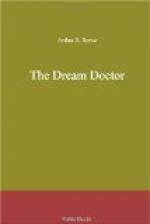We stood for several moments speechless, stupefied. At last O’Connor silently drew a letter from his pocket. It was written on the latest and most delicate of scented stationery.
“It was lying sealed on the dresser when we arrived,” explained O’Connor, holding it so that we could not see the address. “I thought at first she had really committed suicide and that this was a note of explanation. But it is not. Listen. It is just a line or two. It reads: ’Am feeling better now, though that was a great party last night. Thanks for the newspaper puff which I have just read. It was very kind of you to get them to print it. Meet me at the same place and same time to-night. Your Blanche.’ The note was not stamped, and was never sent. Perhaps she rang for a messenger. At any rate, she must have been dead before she could send it. But it was addressed to—Burke Collins.”
“Burke Collins!” exclaimed Kennedy and I together in amazement.
He was one of the leading corporation lawyers in the country, director in a score of the largest companies, officer in half a dozen charities and social or ganisations, patron of art and opera. It seemed impossible, and I at least did not hesitate to say so. For answer O’Connor simply laid the letter and envelope down on the dresser.
It seemed to take some time to convince Kennedy. There it was in black and white, however, in Blanche Blaisdell’s own vertical hand. Try to figure it out as I could, there seemed to be only one conclusion, and that was to accept it. What it was that interested him I did not know, but finally he bent down and sniffed, not at the scented letter, but at the covering on the dresser. When he raised his head I saw that he had not been looking at the letter at all, but at a spot on the cover near it.
“Sn-ff, sn-ff,” he sniffed, thoughtfully closing his eyes as if considering something. “Yes—oil of turpentine.”
Suddenly he opened his eyes, and the blank look of abstraction that had masked his face was broken through by a gleam of comprehension that I knew flashed the truth to him intuitively.
“Turn out that light in the corridor,” he ordered quickly.
Dr. Leslie found and turned the switch. There we were alone, in the now weird little dressing-room, alone with that horribly lovely thing lying there cold and motionless on the little white bed.
Kennedy moved forward in the darkness. Gently, almost as if she were still the living, pulsing, sentient Blanche Blaisdell who had entranced thousands, he opened her mouth.
A cry from O’Connor, who was standing in front of me, followed. “What’s that, those little spots on her tongue and throat? They glow. It is the corpse light!”
Surely enough, there were little luminous spots in her mouth. I had heard somewhere that there is a phosphorescence appearing during decay of organic substances which once gave rise to the ancient superstition of “corpse lights” and the will-o’-the-wisp. It was really due, I knew, to living bacteria. But there surely had been no time for such micro-organisms to develop, even in the almost tropic heat of the Novella. Could she have been poisoned by these phosphorescent bacilli? What was it—a strange new mouth-malady that had attacked this notorious adventuress and woman of luxury?




